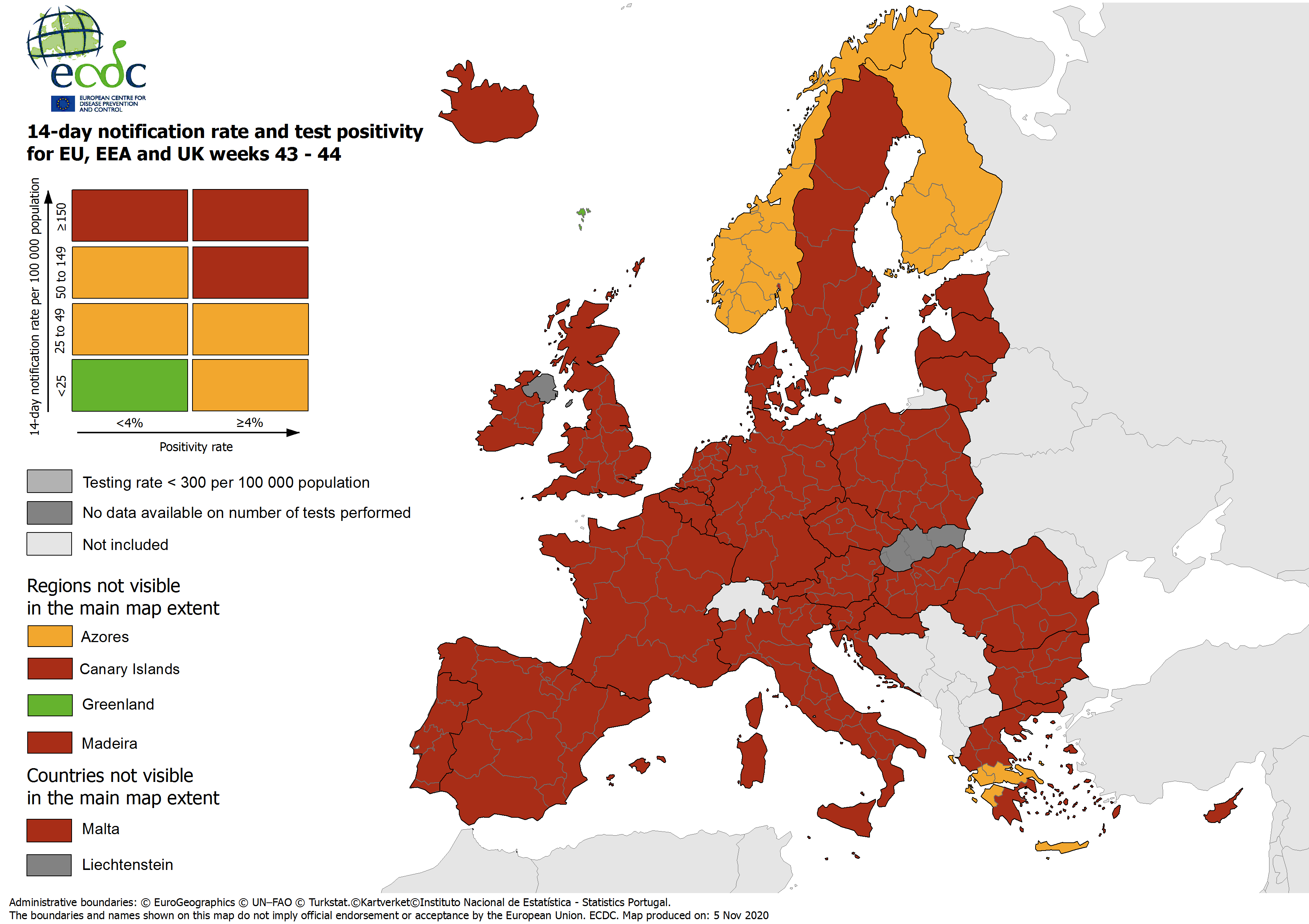The EU ‘Traffic Light’ system for travel will come into effect from tomorrow, Sunday 8th November. Right now, no european countries are listed on the ‘Green List’ – however, once implemented – travellers arriving into Ireland from ‘Green List’ countries will not need to restrict their movements.
Arriving from a Green Country:
- Anyone arriving into Ireland from an EU ‘Green’ country will NOT need to restrict their movements for 14 days.
Arriving from an Orange Country:
- Anyone arriving from an ‘Orange’ country may waive their requirement to restrict movements if they have had a negative PCR COVID-19 test result up to three days before arrival. *
Arriving from a Red Country:
- Anyone arriving from a ‘Red’ country will need to restrict their movement for 14 days. This may be waived following the person testing negative (PCR COVID-19 test) which must be taken 5 days after their arrival. *
EU Council Recommendation and travel for an Essential Purpose
#JustPublished
Updated weekly 🚦 maps are now online!These maps aim to support the @EUCouncil Recommendation on a coordinated approach to the restriction of #FreeMovement in response to the #COVID19 pandemic in the EU and UK.
Find more here: https://t.co/CcBVx6B0o5 pic.twitter.com/1e0xGsOMZj
— ECDC (@ECDC_EU) November 5, 2020
The map is to be updated every Thursday by the ECDC.
Further information is available from the Department of Foreign Affairs:
Ireland is implementing the new EU ‘traffic lights’ approach to travel, which applies to countries in the EU / EEA (+ UK). Our current advice for travel to these countries is ‘exercise a high degree of caution’. Our general advice for any other overseas travel remains ‘avoid non-essential travel’ or in some cases, ‘do not travel’. Travel within the island of Ireland can continue as normal, subject to domestic public health restrictions as outlined on gov.ie.
Our TravelWise app has been suspended while we move to implement the new EU system. We apologise for this inconvenience. Updated information will continue to be provided on this website.
On 13 October, Member States adopted the EU Recommendation on a coordinated approach to travel restrictions in the context of COVID-19. This ‘traffic lights’ approach provides for regions across the European Union (EU) and European Economic Area (EEA) to be categorised as green, orange, red or grey, on the basis of the risk levels associated with COVID-19. A combined indicator map will be published each week by the European Centre for Disease Prevention and Control (ECDC), based on agreed criteria, including the 14-day cumulative incidence rate, testing rate and testing positivity rates.
In line with the EU Recommendation, there will be no entry restrictions on passengers travelling from green regions. Each Member State will decide in due course what entry restrictions it will apply to passengers travelling from red, orange and grey regions. This website will gradually provide more information as it becomes available.
Information about what to do on entering Ireland from abroad:
All passengers arriving into Ireland from overseas are obliged to complete a COVID-19 Passenger Locator Form before entry. In line with the EU traffic lights approach, there are no entry restrictions on travellers from green regions. Currently, all passengers entering Ireland from red, orange and grey regions are requested to restrict their movements for 14 days. For further details please see the Irish Government Advice Page. Everyone is asked to comply with restrictions within Ireland, including those under the National Framework for Living with COVID-19. These are listed on the Official website of the Irish Government.
If you are considering travelling outside of Ireland:
In accordance with Government policy, which is based on official public health advice, the Department of Foreign Affairs continues to advise against non-essential travel overseas, other than to countries that are part of the EU ‘traffic lights’ approach, where the advice is to exercise a high degree of caution (this includes Great Britain but not Northern Ireland). The situation in relation to COVID-19 continues to evolve quickly around the world. Citizens who are considering any overseas travel are advised to carefully monitor the official advice and information from the public authorities in their destination.
Should you decide that you need to travel, you should inform yourself about any requirements in the destination to which you are travelling. Information about entry restrictions currently applied by other countries is available on the country-specific travel advice pages. Additional restrictions may be imposed, including during the duration of your visit. Flight restrictions and route cancellations continue to occur worldwide and there is no guarantee that air routes will operate as scheduled. It is important to check with your insurance provider on coverage at this time. Any Irish citizen considering any overseas travel should monitor news and information from the public authorities in their country or region of destination. Citizens are advised to follow the public health guidelines of the local health authorities and to continue to practice physical distancing measures, hand hygiene and respiratory etiquette etc.
The purpose of the Department’s Travel Advice is to provide information to the general public so that individuals can make informed decisions for themselves. There are significant risks associated with international travel in the context of the COVID-19 pandemic, and this is likely to remain the case for the foreseeable future. Citizens should be aware of the possible limitations to any consular assistance that could be provided. Any citizens who are considering travel abroad, or those already abroad, are advised to monitor our travel advice, and follow us on Twitter. They are also advised to register with their local Irish Embassy or Consulate and regularly check their website and Twitter accounts for details of any local public health measures and travel restrictions.
* Source: TheJournal.ie
Want to get €5, absolutely free? Sign up to the ‘Smart’ Debit Card – Curve today, and earn a fiver on us! Find out more here.

